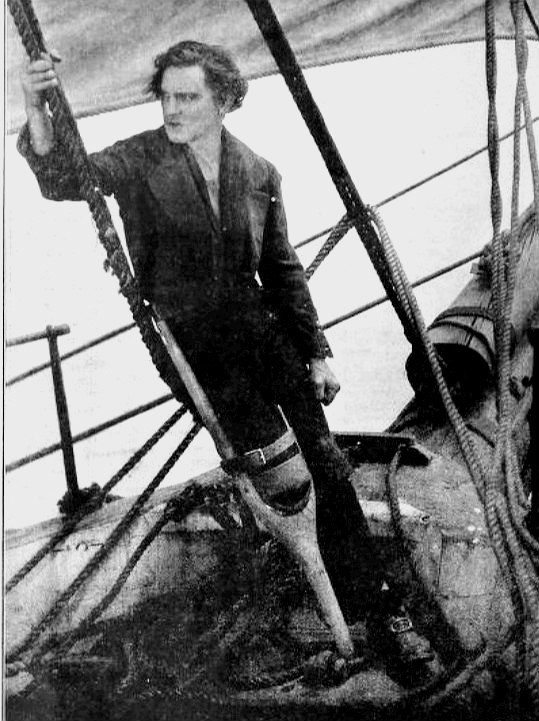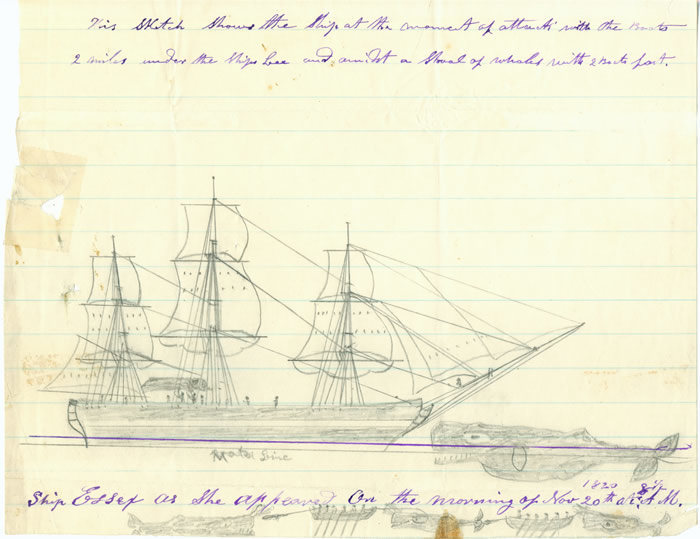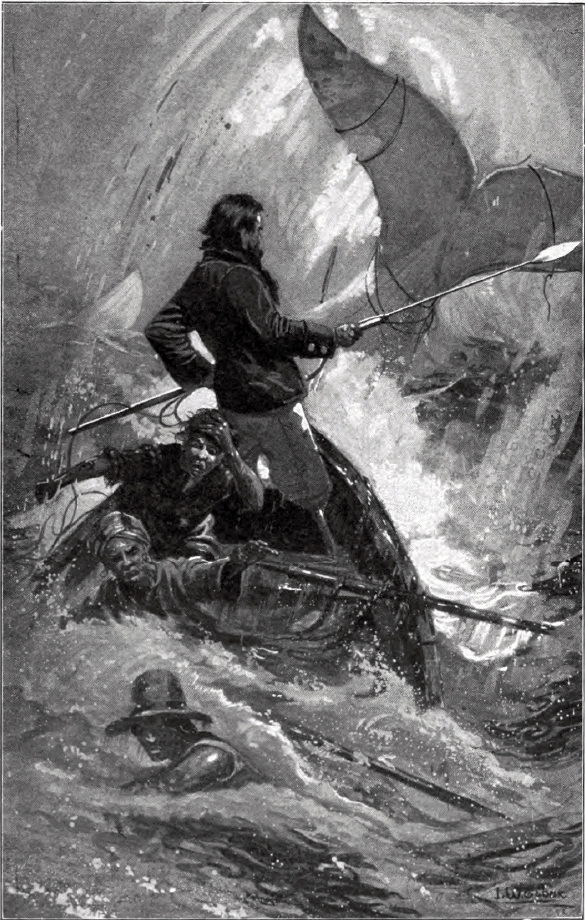|
Moby-Dick
''Moby-Dick; or, The Whale'' is an 1851 novel by American writer Herman Melville. The book is the sailor Ishmael's narrative of the obsessive quest of Ahab, captain of the whaling ship ''Pequod'', for revenge against Moby Dick, the giant white sperm whale that on the ship's previous voyage bit off Ahab's leg at the knee. A contribution to the literature of the American Renaissance, ''Moby-Dick'' was published to mixed reviews, was a commercial failure, and was out of print at the time of the author's death in 1891. Its reputation as a "Great American Novel" was established only in the 20th century, after the 1919 centennial of its author's birth. William Faulkner said he wished he had written the book himself, and D. H. Lawrence called it "one of the strangest and most wonderful books in the world" and "the greatest book of the sea ever written". Its opening sentence, "Call me Ishmael", is among world literature's most famous. Melville began writing ''Moby-Dick'' in February 18 ... [...More Info...] [...Related Items...] OR: [Wikipedia] [Google] [Baidu] |
Herman Melville
Herman Melville (born Melvill; August 1, 1819 – September 28, 1891) was an American novelist, short story writer, and poet of the American Renaissance period. Among his best-known works are ''Moby-Dick'' (1851); '' Typee'' (1846), a romanticized account of his experiences in Polynesia; and ''Billy Budd, Sailor'', a posthumously published novella. Although his reputation was not high at the time of his death, the 1919 centennial of his birth was the starting point of a Melville revival, and ''Moby-Dick'' grew to be considered one of the great American novels. Melville was born in New York City, the third child of a prosperous merchant whose death in 1832 left the family in dire financial straits. He took to sea in 1839 as a common sailor on a merchant ship and then on the whaler ''Acushnet'', but he jumped ship in the Marquesas Islands. ''Typee'', his first book, and its sequel, ''Omoo'' (1847), were travel-adventures based on his encounters with the peoples of the i ... [...More Info...] [...Related Items...] OR: [Wikipedia] [Google] [Baidu] |
Ishmael (Moby-Dick)
Ishmael is a character in Herman Melville's '' Moby-Dick'' (1851), which opens with the line, "Call me Ishmael." He is the first person narrator in much of the book. Because Ishmael plays a minor role in the plot, early critics of ''Moby-Dick'' assumed that Captain Ahab was the protagonist. Many either confused Ishmael with Melville or overlooked the role he played. Later critics distinguished Ishmael from Melville, and some saw his mystic and speculative consciousness as the novel's central force rather than Captain Ahab's monomaniacal force of will. The Biblical name Ishmael has come to symbolize orphans, exiles, and social outcasts. By contrast with his namesake from the Book of Genesis, who is banished into the desert, Melville's Ishmael wanders upon the sea. Each Ishmael, however, experiences a miraculous rescue; in the Bible from thirst, here from drowning. Characteristics Both Ahab and Ishmael are fascinated by the whale, but whereas Ahab perceives him exclusive ... [...More Info...] [...Related Items...] OR: [Wikipedia] [Google] [Baidu] |
Captain Ahab
Captain Ahab is a fictional character and one of the main protagonists in Herman Melville's ''Moby-Dick'' (1851). He is the monomaniacal captain of the whaling ship '' Pequod''. On a previous voyage, the white whale Moby Dick bit off Ahab's leg, and he now wears a prosthetic leg made out of whalebone. The whaling voyage of the ''Pequod'' ends up as a hunt for revenge on the whale, as Ahab forces the crew members to support his fanatical mission. When Moby Dick is finally sighted, Ahab's hatred robs him of all caution, and the whale drags him to his death beneath the sea and sinks the ''Pequod''. Melville biographer Andrew Delbanco calls Ahab "a brilliant personification of the very essence of fanaticism". Scholar F. O. Matthiessen calls attention to the fact that Ahab is called an "ungodly god-like man". Ahab's "tragedy is that of an unregenerate will" whose "burning mind is barred out from the exuberance of love" and argues that he "remains damned". Writer D. H. Lawrence felt ... [...More Info...] [...Related Items...] OR: [Wikipedia] [Google] [Baidu] |
Pequod (Moby-Dick)
''Pequod'' is a fictional 19th-century Nantucket whaling ship that appears in the 1851 novel ''Moby-Dick'' by American author Herman Melville. ''Pequod'' and her crew, commanded by Captain Ahab, are central to the story, which, after the initial chapters, takes place almost entirely aboard the ship during a three-year whaling expedition in the Atlantic, Indian and South Pacific oceans. Most of the characters in the novel are part of ''Pequod''s crew. Ishmael, the novel's narrator, encounters the ship after he arrives in Nantucket and learns of three ships that are about to leave on three-year cruises. Tasked by his new friend, the Polynesian harpooner Queequeg (or more precisely, Queequeg's idol-god, Yojo), to make the selection for them both, Ishmael, a self-described "green hand at whaling," goes to the Straight Wharf and chooses the ''Pequod''. Name Ishmael says that ''Pequod'' was named for the Algonquian-speaking Pequot tribe of Native Americans. Melville knew of the t ... [...More Info...] [...Related Items...] OR: [Wikipedia] [Google] [Baidu] |
Moby Dick (whale)
Moby Dick is a sperm whale who is the main antagonist in Herman Melville's 1851 novel of the same name. Melville based the whale partially on a real albino whale of that period called Mocha Dick. Description Ishmael describes Moby Dick as having two prominent white areas around "a peculiar snow-white wrinkled forehead, and a high, pyramidical white hump", the rest of his body being of stripes and patches between white and gray. The animal's exact dimensions are never given, but the novel claims that the largest sperm whales can reach a length of (larger than any officially recorded sperm whale) and that Moby Dick is possibly the largest sperm whale that ever lived. Ahab tells the crew that the White Whale can be told because he has an unusual spout, a deformed jaw, three punctures in his right fluke and several harpoons embedded in his side from unsuccessful hunts. Yet Ishmael insists that what invested the whale with "natural terror" was that "unexampled, intelligent maligni ... [...More Info...] [...Related Items...] OR: [Wikipedia] [Google] [Baidu] |
Great American Novel
The Great American Novel (sometimes abbreviated as GAN) is a Western Canon, canonical novel that is thought to embody the essence of United States, America, generally written by an American and dealing in some way with the question of America's Culture of the United States, national character. The term was coined by John William De Forest in an 1868 essay. Although De Forest mentioned ''Uncle Tom's Cabin'' (1852) by Harriet Beecher Stowe as a possible contender, he noted that the Great American Novel had most likely not been written yet. Writer Henry James used the shortened term, GAN, in 1880. Practically, many academics use the term to refer to a small number of books that have historically been the nexus of discussion, including ''Moby-Dick'' (1851), ''Adventures of Huckleberry Finn'' (1884), and ''The Great Gatsby'' (1925). However, there is no consensus on which novel, or novels, merits the title of Great American Novel. The idea has evolved and continued into the modern a ... [...More Info...] [...Related Items...] OR: [Wikipedia] [Google] [Baidu] |
Sperm Whale
The sperm whale or cachalot (''Physeter macrocephalus'') is the largest of the toothed whales and the largest toothed predator. It is the only living member of the genus '' Physeter'' and one of three extant species in the sperm whale family, along with the pygmy sperm whale and dwarf sperm whale of the genus ''Kogia''. The sperm whale is a pelagic mammal with a worldwide range, and will migrate seasonally for feeding and breeding. Females and young males live together in groups, while mature males (bulls) live solitary lives outside of the mating season. The females cooperate to protect and nurse their young. Females give birth every four to twenty years, and care for the calves for more than a decade. A mature sperm whale has few natural predators, although calves and weakened adults are sometimes killed by pods of killer whales (orcas). Mature males average in length, with the head representing up to one-third of the animal's length. Plunging to , it is the third d ... [...More Info...] [...Related Items...] OR: [Wikipedia] [Google] [Baidu] |
Essex (whaleship)
''Essex'' was an American whaling ship from Nantucket, Massachusetts, which was launched in 1799. In 1820, while at sea in the southern Pacific Ocean under the command of Captain George Pollard Jr., the ship was attacked and sunk by a sperm whale. Thousands of miles from the coast of South America with little food and water, the 20-man crew was forced to make for land in the ship's surviving whaleboats. The men suffered severe dehydration, starvation, and exposure on the open ocean, and the survivors eventually resorted to eating the bodies of the crewmen who had died. When that proved insufficient, members of the crew drew lots to determine whom they would sacrifice so that the others could live. Seven crew members were cannibalized before the last of the eight survivors were rescued, more than three months after the sinking of the ''Essex''. First mate Owen Chase and cabin boy Thomas Nickerson later wrote accounts of the ordeal. The tragedy attracted international attent ... [...More Info...] [...Related Items...] OR: [Wikipedia] [Google] [Baidu] |
Mocha Dick
Mocha Dick (; died 1838) was a male sperm whale that lived in the Pacific Ocean in the early 19th century, usually encountered in the waters near Mocha Island, off the central coast of Chile. American explorer and author Jeremiah N. Reynolds published his account, "Mocha Dick: Or The White Whale of the Pacific: A Leaf from a Manuscript Journal" in 1839 in ''The Knickerbocker''. Mocha Dick was an albino and partially inspired Herman Melville's 1851 novel ''Moby-Dick''. Delbanco, Andrew. ''Melville, His World and Work''. New York: Alfred A. Knopf, 2005: 167–168. History Mocha Dick survived many skirmishes (by Reynolds' account at least 100) with whalers before he was eventually killed. He was large and powerful, capable of wrecking small craft with his fluke. Explorer Jeremiah N. Reynolds gathered first-hand observations of Mocha Dick and published his account, "Mocha Dick: Or The White Whale of the Pacific: A Leaf from a Manuscript Journal", in the May 1839 issue of ''The Kn ... [...More Info...] [...Related Items...] OR: [Wikipedia] [Google] [Baidu] |
Whaler
A whaler or whaling ship is a specialized vessel, designed or adapted for whaling: the catching or processing of whales. Terminology The term ''whaler'' is mostly historic. A handful of nations continue with industrial whaling, and one, Japan, still dedicates a single factory ship for the industry. The vessels used by aboriginal whaling communities are much smaller and are used for various purposes over the course of the year. The ''whale catcher'' was developed during the age of steam, and then driven by diesel engines throughout much of the twentieth century. It was designed with a harpoon gun mounted at its bow and was fast enough to chase and catch rorquals such as the fin whale. At first, whale catchers either brought the whales they killed to a whaling station, a settlement ashore where the carcasses could be processed, or to its factory ship anchored in a sheltered bay or inlet. With the later development of the slipway at the ship's stern, whale catchers were abl ... [...More Info...] [...Related Items...] OR: [Wikipedia] [Google] [Baidu] |
William Shakespeare
William Shakespeare ( 26 April 1564 – 23 April 1616) was an English playwright, poet and actor. He is widely regarded as the greatest writer in the English language and the world's pre-eminent dramatist. He is often called England's national poet and the " Bard of Avon" (or simply "the Bard"). His extant works, including collaborations, consist of some 39 plays, 154 sonnets, three long narrative poems, and a few other verses, some of uncertain authorship. His plays have been translated into every major living language and are performed more often than those of any other playwright. He remains arguably the most influential writer in the English language, and his works continue to be studied and reinterpreted. Shakespeare was born and raised in Stratford-upon-Avon, Warwickshire. At the age of 18, he married Anne Hathaway, with whom he had three children: Susanna, and twins Hamnet and Judith. Sometime between 1585 and 1592, he began a successful career in London as an ... [...More Info...] [...Related Items...] OR: [Wikipedia] [Google] [Baidu] |
Nautical Fiction
Nautical fiction, frequently also naval fiction, sea fiction, naval adventure fiction or maritime fiction, is a genre of literature with a setting on or near the sea, that focuses on the human relationship to the sea and sea voyages and highlights nautical culture in these environments. The settings of nautical fiction vary greatly, including merchant ships, liners, naval ships, fishing vessels, life boats, etc., along with sea ports and fishing villages. When describing nautical fiction, scholars most frequently refer to novels, novellas, and short stories, sometimes under the name of sea novels or sea stories. These works are sometimes adapted for the theatre, film and television. The development of nautical fiction follows with the development of the English language novel and while the tradition is mainly British and North American, there are also significant works from literatures in Japan, France, Scandinavia, and other Western traditions. Though the treatment of themes a ... [...More Info...] [...Related Items...] OR: [Wikipedia] [Google] [Baidu] |






